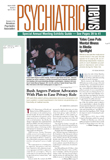Advocates of mental health parity in insurance coverage are concentrating their efforts on the House this year, where a new bill was introduced in March by Reps. Marge Roukema (R-N.J.) and Patrick Kennedy (D-R.I.). The Senate passed an identical bill last year (S 543) but it was ultimately defeated as an amendment to an appropriations bill last December (Psychiatric News, January 18).
The Mental Health Equitable Treatment Act (HR 4066) requires health plans with mental health benefits to provide the same treatment limits and cost sharing requirements as for other medical benefits. However, the bill applies only to in-network services, exempts businesses with up to 50 employees, and allows health plans to manage mental health care.
If the bill becomes law, it will go into effect next January, when the one-year extension of the 1996 parity law passed by Congress last December expires.
House Republicans on an appropriations conference committee voted against the Senate parity bill last year, complaining that the bill was never heard by House committees that address health issues. These committees are Ways and Means, Energy and Commerce, and Education and the Workforce. Committee chairs were instructed by the House leadership to hold hearings on parity and act on parity legislation this year.
The House Education and the Workforce Subcommittee on Employer-Employee Relations held a hearing on parity in mid-March. Chair Sam Johnson (R-Tex.) said, “The hearing was held to hear the concerns of mental health advocates and allow employers and care managers to explain how the expanded requirements would impact the care they provide.”
The Energy and Commerce Subcommittee on Health is expected to hold a hearing on the Roukema-Kennedy bill, which was referred also to the Education and the Workforce subcommittee.
Roukema called HR 4066 a compromise measure because it doesn’t cover substance abuse parity as did her 2001 parity bill. In introducing the new bill, Roukema said, “While there are over 203 cosponsors of HR 162 (the Mental Health and Substance Abuse Parity Amendments of 2001), I recognize the political reality that the legislation in its current form is not likely to move forward in the House.”
The bill has languished in subcommittees since last May. This year’s bill requires a study of substance abuse parity.
However, opponents appear to be more concerned that the legislation mandates parity for all conditions listed in the DSM-IV. Health plans that offer mental health benefits only for biologically based illnesses would be required to offer mental health benefits for all conditions in DSM-IV, which they argue would be costly.
Kay Nystul, a behavioral health nurse and case manager with Wausau Benefits, testified at the March hearing. “Federally mandated coverage for all conditions in the DSM-IV is not the right prescription for effective allocation and delivery of mental health benefits. A clear distinction needs to be drawn between biologically based mental illness and other conditions listed in the DSM-IV.”
Jane Greenman, vice president and deputy general counsel for Honeywell International, testified for the ERISA Industry Committee that a broad mental health parity mandate “will likely result in increased employee cost-sharing, reductions in other health care coverage, and/or the elimination of mental health coverage entirely.”
However, studies of states with laws mandating full parity found that serious mental illnesses accounted for 80 percent to 90 percent of the costs of mental health care, according to Michael Strazzella, deputy director for congressional relations in APA’s Division of Government Relations (DGR). “For a fraction more, you can have full parity.” Since January DGR staff have been meeting with key House committee staff and legislative aides who focus on health issues to move parity forward in the House this year.
Henry Harbin, M.D., a psychiatrist and CEO of Magellan Health Services, which manages mental health benefits for employees in 29 states with parity legislation and for federal employees, testified that the total health care premium after parity mandates were enacted has not increased above 1 percent. “In fact, our experience is that parity typically increases costs ranging from .2 percent to .8 percent of the health care premium,” said Harbin.
The Congressional Budget Office estimated last year that S 543, the companion to HR 4066, if enacted, would have increased premiums for group health insurance by an average of .9 percent, said Harbin.
Many Republican members of the House Education and the Workforce Committee consider parity an issue with potential for bipartisan consensus, if it doesn’t endanger health benefits for workers. “If we can work on a bipartisan basis with President Bush and both parties to address the concerns of mental health advocates and employers, then that is what the committee is going to work toward,” Kevin Smith, a committee spokesperson, told Psychiatric News.
APA’s written statement to the House Education and the Workforce Committee on the importance of parity legislation is available online at www.psych.org/pub_pol_adv/edworkforce.cfm. ▪
